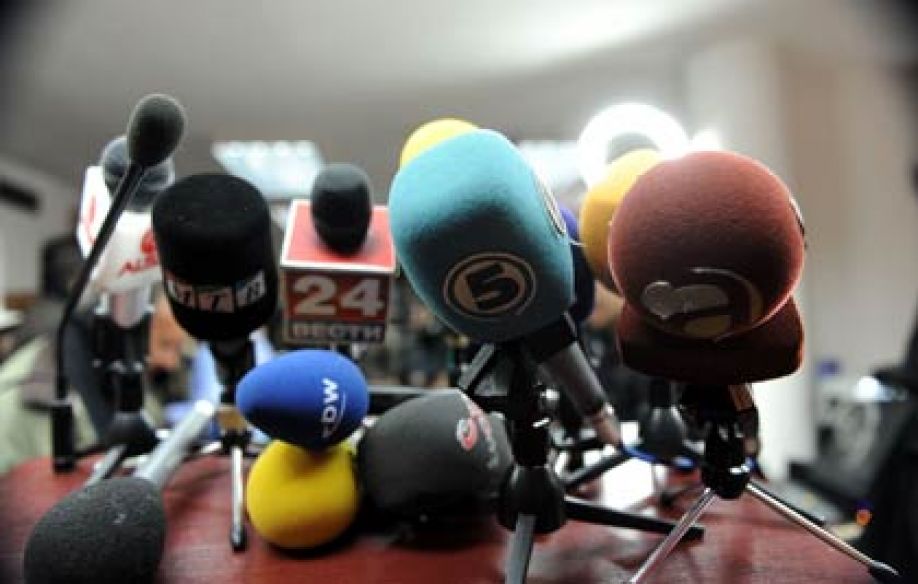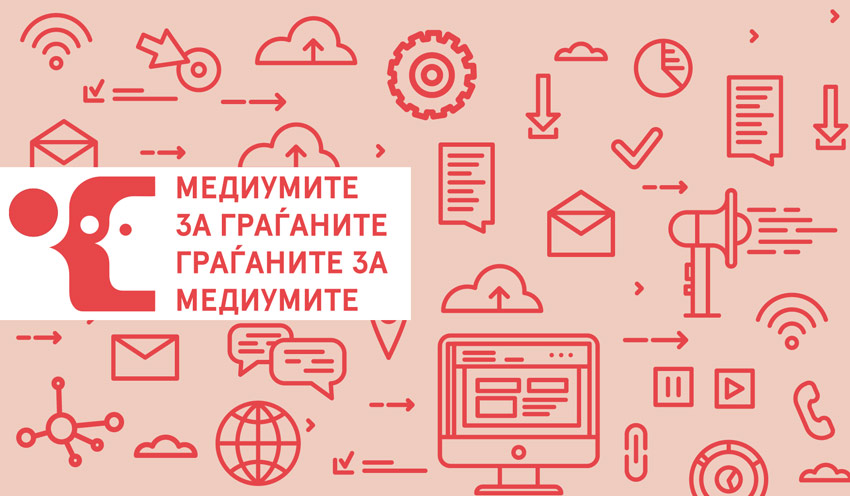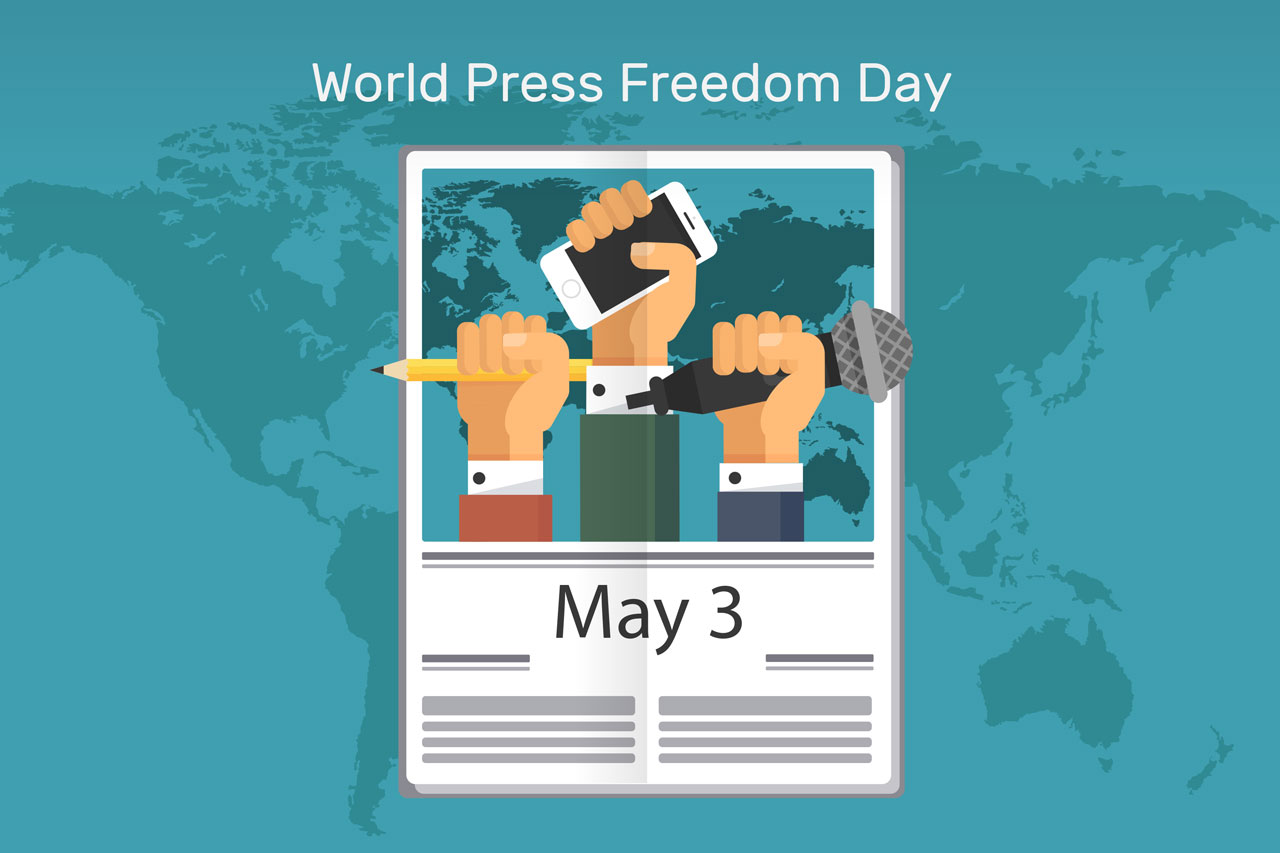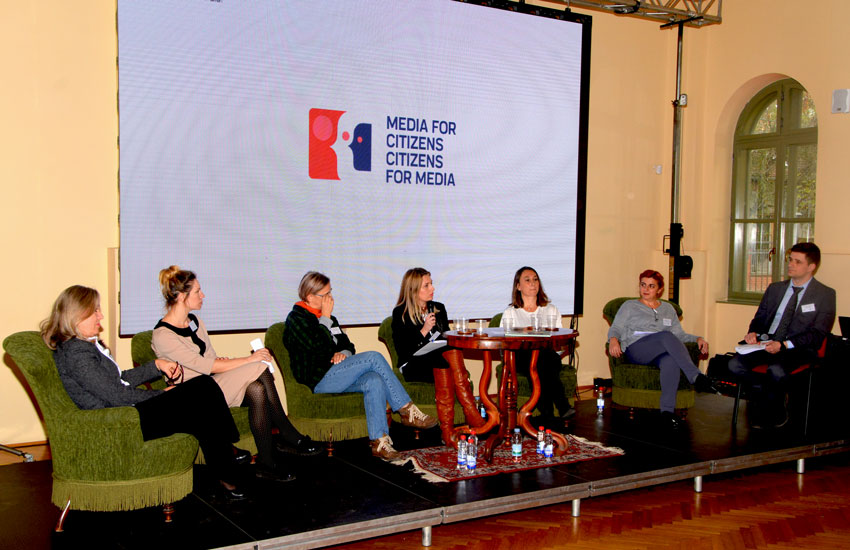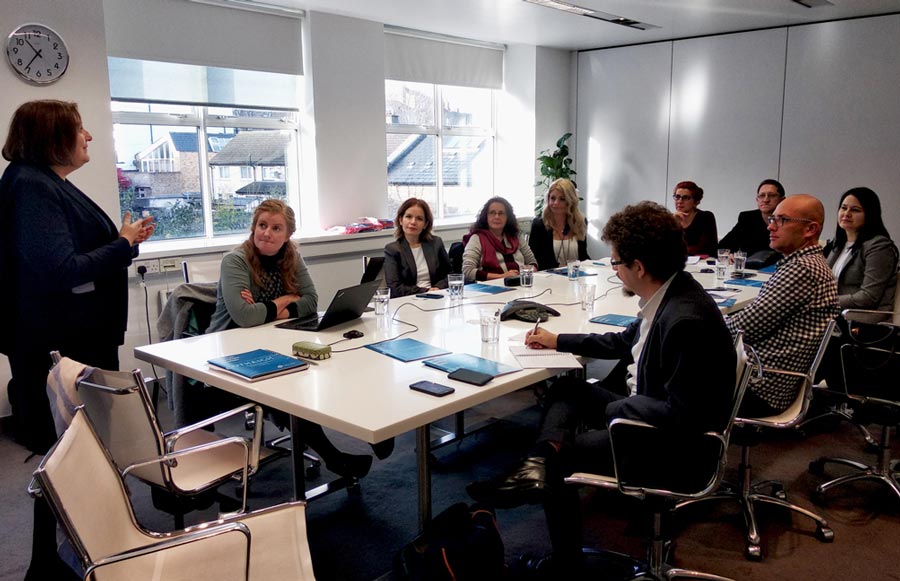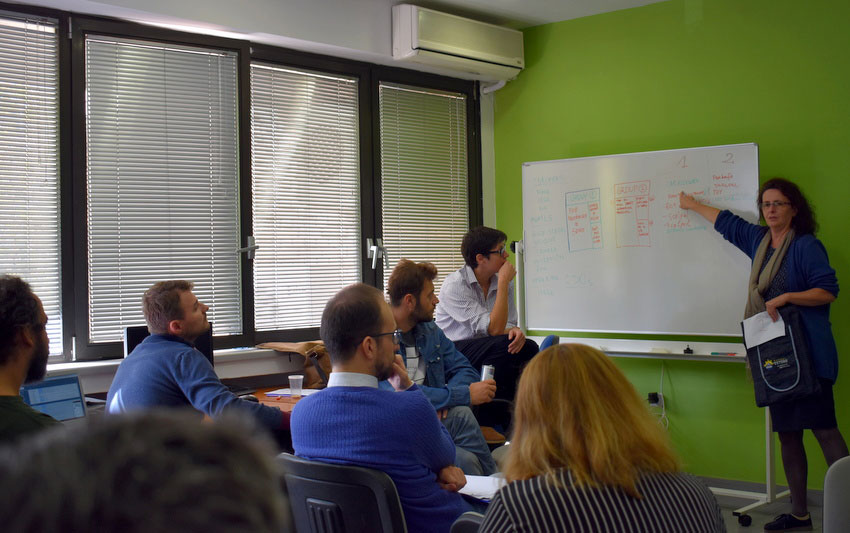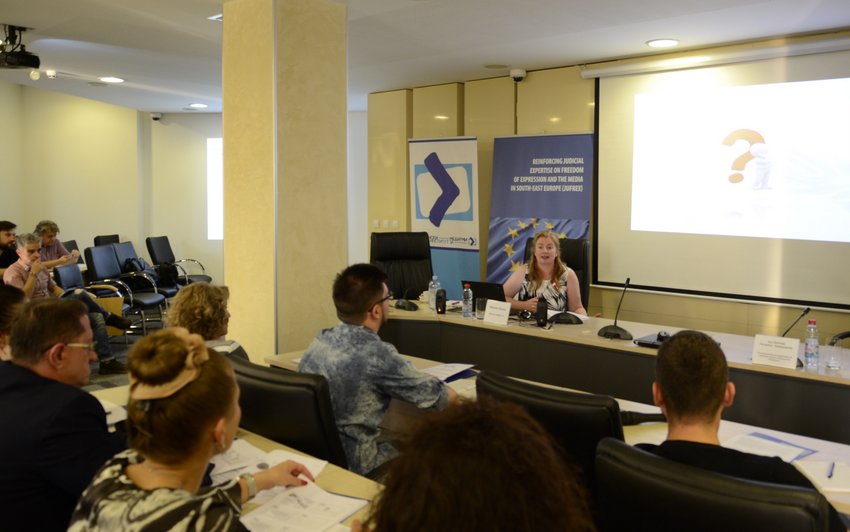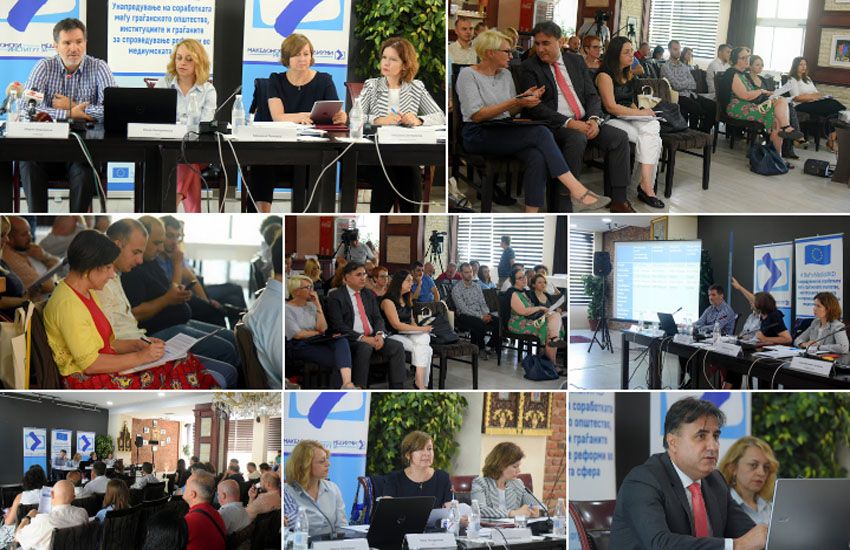The Association of Journalist of Macedonia (AJM), the Council of Media Ethics of Macedonia (CMEM), the Independent Union of Journalists and Media Workers (SSNM) and the Macedonian Institute for Media are seriously concerned about the unreasonable delay in the procedure for appointment of members in the Council of the Agency of Audio and Audiovisual Media Services and the Program Council of the PSB Macedonian Radio and Television.
We appeal to the President and the members of the Committee for Selection and Appointments in the Assembly of the Republic of North Macedonia to start the process of selection and appointment of members of these bodies. Any further interference or delay of the procedure will seriously affect the implementation of the media reform process in the country.
The long-awaited systemic reforms in the media sphere, which should enable the media to function independently and professionally, depends on the selection of the members in these bodies. We would like to remind that media reforms are crucial for the EU integration processes, which is also noted in the latest European Commission: "the country should make an effort to improve the independence and professional standards of the public broadcasting service and its financial independence". However, it is expected that the selection of members of both bodies will be transparent and fair, based on candidates' expertise.
The Competition was announced in January 2019, and the final decision about the selection of the members of the both bodies should have been completed right after the Presidential elections.
We would like to stress that the Government, the Parliament and all political actors have the responsibility to seriously approach this process and put themselves above the interests of the parties in order to prevent further damage in the media sector.
News
The Macedonian Institute for Media, in the past period as a part of the regional project "Media for Citizens - Citizens for the Media", announced a call for grants for civil society organizations and conducted a procedure for selecting the best project proposals.
The Council of Media Ethics of Macedonia (CMEM), the Association of Journalists of Macedonia (AJM), the Independent Union of Journalists and Media Workers (SSNM) and the Macedonian Institute for Media (MIM), on the occasion of celebration of the World Press Freedom Day, May 3d, would like to recall to the need for serious engagement of all relevant actors in undertaking the major reform steps in the media sector in the country.
In the past period some efforts were made, resulting with improvement of the working environment for the journalists and media workers, which in turn, improved the country’s image in the international media freedom reports. For illustration, our country is ranked 95th according to the latest World Press Freedom Index of “Reporters Without Borders”, going up 14 places in comparison to 2018’ report.
However, we would like to remind that the key systemic changes in the media sector are not yet completed, such as the reforms in the public broadcasting service and the media regulator. In addition, commercial media continue to face strong challenges due to the small and limited media and advertising market, which in turn affects the quality of the media content. At the same time, we appeal to the Government and the institutions of the system, when bringing decisions considering improvement of the situation in journalism and media content to coordinate it with the professional media and journalistic community in the country.
In the first half of 2019 more incidents were noted where the rights of the journalists, cameramen and other media workers were violated, to what we have been constantly pointing out. We appeal to the Public Prosecution Office and the courts processes and finalize the cases in which the rights of journalists were violated, as well as the cases that include hate speech, in order to overcome the long time existing impunity practice and to prevent injustice towards media community.
We would like to remind to the need of taking urgent measures regarding labor rights of the journalists and media workers, taking into consideration that half of them are without employment contracts, especially in the online media sphere. In that direction, we expect the institutions to sanction the constant breaches of the Labor Relations Law and to ensure climate that will encourage social dialogue and resolution of the issues concerning labor conditions.
The four organizations will continue to advocate for strong promotion of the media self-regulation as a mechanism for enhancing the professionalism, ethics and independence in the media, prevention of influence of different centers of power and mechanism that allows the public to receive quality and independent information.
Prior to the second round of voting for the President in the country, the four organizations would like to remind the media to their duties to report professionally and according to the principles stated in the CMEM’ Charter on Ethical Reporting during Elections:
- truthfulness and objectivity,
- the principle of balance,
- clear distinction between information and comments,
- fairness and impartiality,
- professional solidarity among media,
- editorial independence and professional integrity,
- respect and tolerance and
- freedom and responsibility.
We will continue the intensive cooperation with our respected international partners, European Federation of Journalists (EFJ) and International Federation of Journalists (IFJ). We stand together in support of the campaign of the International Federation of Journalists (IFJ) - “The role of media in elections and democracy”, whose purpose is to enable media access to free and diverse information, independent from the influence of the centers of political and economic power.
Council of Media Ethics of Macedonia (CMEM)Association of Journalists of Macedonia (AJM)Independent Union of Journalists and Media Workers (SSNM)Macedonian Institute for Media (MIM)
Skopje, May 3, 2019
Seventy media and information literacy (MIL) experts, journalists, civil society activists and representatives of education sector and state agencies gathered on 23 November in Novi Sad at a major regional conference on MIL.
The event, organized by the Novi Sad School of Journalism, was part of a three year project “Media for Citizens – Citizens for Media,” implemented by the members of the Network of Professionalization of Media in South East Europe (SEENPM) in Albania, Bosnia and Herzegovina, Montenegro, Macedonia and Serbia.
The aim of the conference was to establish the current state of MIL in the Western Balkans through analyzing ongoing initiatives, activities and strategies, and to enable experience exchange among actors from different sectors and countries.
The event opened by presentation of preliminary results of research, conducted within the project, focused on the analysis of MIL policy and practice in each of the project countries.
Research coordinator, Brankica Petković (Peace Institute, Ljubljana), announced the publishing of national studies and a regional overview of findings.
Presenting the regional research overview, research coordinator Brankica Petković (Peace Institute, Ljubljana) stressed that civil society organizations have been pioneers in promoting MIL. Their work, however, is dependent on short-term project and donor support. Engagement of the media industry and journalists in the promotion of MIL is rare, although their experience is key in strengthening the position of citizens. Public service media have done little regarding MIL and so they should be, along with media regulators, legally obliged to promote MIL and cooperate with citizens, Petković stated as one of the conclusions of the research.
Another conclusion is that there is an urgent need for cooperation between state institutions responsible for media and education as their initiatives so far have been sporadic and with uncertain outcomes. Integrating MIL into formal education is of highest importance as only then can we expect mass dissemination of MIL knowledge and skills.
The research will result in the publication of national studies with a regional overview.
Policy and Practice
The conference continued with a session aimed at examining whether MIL policies keep up with MIL practice in the region as civil society organizations are often the leaders in advocating MIL and promoting MIL skills and knowledge.
Professor of literature Božena Jelušić from Montenegro presented the very positive effects of a teaching method that combines literature and MIL. The method was introduced into the country’s grammar schools in 2008 as an elective subject based on Jelušić's initiative. The number of students enrolling into the course has been on decline, though, because schools fail to present it to students adequately
The growing role of libraries as centers for MIL education was the focus of a presentation by Gordana Ljubanović of the Public Library in Budva, Montenegro. She explained that a strategy document for spreading MIL through library network has been produced, but it hasn’t gone through instutional procedure yet, which significantly discourages the initative implementors from further activitities.
In Bosnia’s entity Republika Srpska, a campaign to strengthen MIL among children has seen the entity’s public service broadcaster and a number of government departments working together, explained Sandra Kovačević of the Ministry of Transport and Communications The effort will include hands-on learning among students and teachers and practical work in partnership with the media. The aim is the adoption of MIL policies and an adequate legal framework for MIL.
In Macedonia, there is a program for MIL promotion at the state level. A MIL network gathering government institutions, non-governmental organizations and other actors has been set up. Emilija Petreska-Kamenjarova of the Agency for Audio and Audiovisual Media Services in Macedonia presented Mediumskapismenost.mk, website, which provides updates on MIL activities in the country and serves as an education and resource center.
Useful Examples and Lessons
During three parallel sessions, representatives of media, education and civil society sectors presented MIL initiatives in their countries.
SHARE Foundation in Serbia produced a ten-part documentary series “U mreži” (“Networked”). Each episode covers a topic on the use of the internet and social networks (e.g. freedom of expression, online privacy, virtual reality etc.). The episodes feature experts from all over Europe. The series is available on the website Umrezi.rs and on YouTube. The website also offers longer interviews with experts and additional education material. The Serbian public service broadcaster, RTS, was supposed to air the series in its education programs, but then decided not to.
The Novi Sad School of Journalism has been working on MIL for ten years, with a focus on educating teachers in elementary and secondary schools, explained Tijana Femić. The organization offers the only accredited program of the kind in Serbia. As of last year, the School has been implementing the project “Digitalni pogon” (“Creative Drive”), whose activities span ten elementary and ten secondary schools in Serbia, focusing on collaborative work of teachers and students in producing media content and promoting innovation and critical thinking
Ervin Goci of the University of Tirana presented the pilot TV program “Algorithm” on MIL issues aired weekly on the Albanian public service broadcaster, RTSH.
Elvira Ceković of the Agency for Electronic Media of Montenegro presented a research (conducted in cooperation with the Ipsos agency) on children’s digital habits. Children spend a significant amount of time in front of different screens, while many parents see nothing wrong with that.
Website Analiziraj.ba analyzes media content with the focus on shortcomings divided into 11 categories, including bias, sensationalism and spread of nationalism. The website serves as a tool for spreading MIL awareness in Bosnia and Herzegovina.
Albanian journalist Merxhan Daci presented Faktoje.al, a website whose purpose is to fact-check politicians’ statements and the level of fulfillment of their promises. It also helps the audience differentiate between false information and truthful media content
In Macedonia, there is a range of civil society initiatives on MIL, but they lack institutional support, said Aleksandra Temenugova of the Institute of Communication Studies in the country. Temenugova also referred to a research project currently conducted in elementary schools which examines how the education system teaches children media and information literacy. She expects the research will find that the system insufficiently prepares children for dealing with current media and information environments as it uses an obsolete curriculum that doesn’t correspond to children’s media reality.
MIL as Key for Better and Free Media?
The event closed with a discussion with a group of leading Serbian journalists on the relationship between the media and initiatives for improving MIL. Will media literate citizens reward high quality, ethical and responsible journalism with trust? Can more aware audience help reduce political and economic pressures on media?
The panelists agreed that the most important contribution that journalists can make to MIL is through respect of ethical codes and the highest professional standards.
Ljubica Gojgić, a journalist with Radio Television Vojvodina (one of Serbia’s public service broadcasters) explained that media outlets often conduct audience research, not in order to raise the levels of MIL, but to adapt production to the audience wishes and not necessarily to public service values.
____________________________________________________________________________________________________________
The project “Media for Citizens – Citizens for Media” will continue until January 2021 with a range of national and regional activities in the Western Balkan countries, including advocacy, media production, publishing, training programs and programs of knowledge and experience exchange, as well as with a program of small grants for MIL initiatives.
The project is implemented by a group of six members of the Network for Professionalization of Media (SEENPM), led by Mediacentar Sarajevo.
Find out more about the project and follow its activites on these channels:
www.cimusee.orghttps://www.facebook.com/CIMUSEE/ @CIMU_SEE
www.seenpm.orghttps://www.facebook.com/seenpm.org/@SEENPM_org
Download the introductory chapters:
In English: Albania, Bosnia and Herzegovina, Macedonia, Montenegro, Serbia.In local languages: Bosnia and Herzegovina, Macedonia, Montenegro, Serbia.
The regional program “Media for Citizens – Citizens for Media: Strengthening the Capacity of NGOs for the Development of Media and Information Literacy in the Western Balkans” is implemented with the support of the European Union by partner organizations Mediacentar Sarajevo, Albanian Media Institute,Macedonian Institute for Media, Montenegrin Media Institute, Novi Sad School of Journalism, Peace Institute, SEENPM.
Exchange of knowledge, experience and practices between representatives of Macedonian and Irish Media Literacy Networks was the purpose of the study visit to Dublin for a group of stakeholders from Macedonia, which was organized by MIM during November 13th and 14th, in the frames of the project “Reinforcing Judicial Expertise on Freedom of Expression and the Media in South-East Europe (JUFREX), funded by the European Union and the Council of Europe.
The group was made of representatives from the Ministry of Education, The Bureau for Education Development, the Agency for Audio and Audiovisual Media Services (AAAMS), First Program Service of Macedonian Television, MIM, Institute of Communication Studies, Foundation Metamorphosis and CSO Conedu Global.
They met with representatives of the Broadcasting Authority of Ireland (BAI), who hosted the visit. The BAI team presented the functioning and administration of the Irish Media Literacy Network and their efforts to increase the awareness of this concept in different areas of the Irish society, such as education, media and civil society sector.
The Macedonian team participated at the Media literacy Ireland Autumn Conference, which was hosted by Virgin Media TV, member of Irish ML Network. The event was attended by most of the 114 member organizations from Ireland, who presented some of their latest research findings and participated in panel discussions about Irish Network and Update, the role of ML during times of social change, and shared experiences with various initiatives and projects they are running.
Within the panel dedicated to exchange of experiences between Irish and other European stakeholders, Ms. Emilija Petreska - Kamenjarova from the AAAMS, member of the Macedonian team, gave a presentation about the Macedonian ML Network history and cooperation among relevant national stakeholders.
The study visit included bilateral meetings with representatives of the Irish ML Network, such as the Irish Film Institute, Transparent Referendum Initiative, the community station Near Radio and the Center for Critical Media Literacy. The discussions resulted with exchange of ideas for different initiatives that will extend the cooperation between the Irish and Macedonian ML stakeholders in the future.
Development of media literacy skills, recognizing and dealing with fake news, producing multimedia content and preparation of effective training programs in the field of media and information literacy were some of the topics of the two-day training for trainers organized by MIM in late September. The workshop was part of the regional project "Media for Citizens - Citizens for Media", led by Mediacentar Sarajevo and implemented by consortium of media CSOs.
In total 16 representatives of civil society organizations, media and educational institutions participated at the training. Under the guidance of the two trainers, Naomi Thompson from the European Association for Viewers’ Interests (EAVI), UK and Stefan Janjic from the Novi Sad School of Journalism, Serbia, the participants had opportunity to build on their theoretical knowledge and engage in practical and interactive part of the training.
"Media literate citizens are able to create media content and respond to information in a responsible manner. The various perspectives they bring, can contribute to tackling wrong narratives and the fake news we see in the media", Naomi Thompson from EAVI said. She believes that media education should be lifelong learning, starting from the earliest age in kindergartens, to the end of life.
Today, people are increasingly talking about media literacy, critical thinking, about fake news and I think that now is the right moment to make some changes, to motivate people to educate themselves and be more media literate", Stefan Janjic from the Novi Sad School of Journalism pointed out. According to him, media literacy programs are extremely important because the media are present every where around, whether we are talking about social or mainstream media, they reach every segment of our lives, our relations, as well as political and economic spheres.
The trainees will be engaged as trainers on further trainings and workshops that MIM will oranize in the upcoming period for local CSOs that are interested in media and information literacy.
The regional program "Media for citizens - Citizens for media: Strengthening the capacities of civil society organizations for the development of the MIL in the countries of Western Balkans" is implemented with the support of the European Union.
Seven media development organizations in the Western Balkans have joined forces under an EU funded project ’Media for Citizens – Citizens for Media’ to build capacities of CSOs to advance media and information literacy (MIL) in the region.
The project (2018 – 2021) strives to contribute to strengthened and vibrant civil society actively advocating for advancement of MIL policies and practices in Albania, Bosnia and Herzegovina, Macedonia, Montenegro and Serbia.
What will the project do?
Research reports will map the current state of MIL policies and practices in each country and the region as the basis for following activities.
MIL coalitions will be formed in each country as inter-sectorial working groups to draft advocacy plans and coordinate their implementation, supported by advocacy campaigns.
MIL Regional Screenshot, a one-day event, will gather various stakeholders, activists/experts and practitioners in Novi Sad, Serbia, for a regional exchange on how to advance MIL.
MIL Summer Festival will gather some 150 participants in Ohrid, Macedonia for educational workshops, expert panels and networking sessions featuring leading regional and EU-based experts so as to exchange knowledge and practice on innovative and creative digital solutions for promoting and teaching MIL.
Training future trainers will create a regional pool of 50 MIL trainers to train civil society organizations eager to advance and promote MIL across the region.
40 MIL initiatives by civil society organizations will be funded by this project to raise awareness and educate about MIL and its importance.
Online campaigns will put in the spotlight the views about MIL of journalists, teachers and citizens – students, parents, the elderly – as the main protagonists.
“Journalism for Citizens” will bring renowned journalists into high schools to bring MIL closer to students focusing on media freedom and critical understanding of media contents.
Follow “Media for Citizens – Citizens for Media“!www.cimusee.org https://www.facebook.com/CIMUSEE/ @CIMU_SEEwww.seenpm.org https://www.facebook.com/seenpm.org/ @SEENPM_org
You can reach us at admin@seenpm.org for any information about the project.
The regional program “Media for Citizens – Citizens for the media: Strengthening the Capacity of NGOs for the Development of Media and Information Literacy in the Western Balkans” is implemented with the support of the European Union by partner organizations Mediacentar Sarajevo, Albanian Media Institute,Macedonian Institute for Media, Montenegrin Media Institute, Novi Sad School of Journalism, Peace Institute, SEENPM .
Media and IT Literacy is a dynamic concept of life-long learning, and its definition changes along with the changes in the technology. However, the power of cooperation among the different stakeholders – both institutional and non-institutional – is key to the development in this sphere, i.e. to the understanding of its very concept and its implementation on the citizens’ part.
This was stressed, among other things, by Ms. Martina Chapman, a media literacy expert from Ireland, at the workshop on “Strengthening the Media Literacy Network of the Republic of Macedonia Through Exchange of Experiences”, which was organized by the Macedonian Media Institute, in cooperation with the Agency for Audio and Audiovisual Media Services.
The meeting was aimed at conveying experiences regarding the strategies and activities needed when planning media literacy projects, as well as good practices that have resulted from the cooperation among the relevant stakeholders. In this, an overview was presented of examples from the Republic of Ireland, which has an operational media literacy network and this concept enjoys the institutions and society’s significant support.
Ms. Chapman explained that the Media Literacy – Ireland Network is an independent association founded by the Irish regulatory authority. It includes 100 members, which are dedicated to promoting and enhancing media literacy all over the country, through sharing experiences and resources, with the aim of gaining benefits for all, and not only for certain parts of society. The Network has its own strategy, work groups that function within its frameworks, and carries out various activities, issues its own Newsletter, develops a data-base of resources and a stakeholders’ networking platform. According to Ms. Chapman, the Network aims to become self-sustainable in the following few years.
The workshop was organized as part of the joint EU and CoE project titled “Reinforcing Judicial Expertise on Freedom of Expression and the Media in South-East Europe (JUFREX)”. The Macedonian Institute for Media is the Macedonian partner of the project.
The photo-gallery of the Workshop is available at this link
The need of wider institutional engagement in identifying the strategic goals of functioning and developing the media sphere, determination of short term and long term measures for support of the existence of regional, local and nonprofit media and the media of the small communities, as well as the need of introducing subsidies for different types of media and platforms which hardly exist on the market. These were some of the topics of the conference “Strategy for Development of Media Sector - the Needs, the Challenges, the Stakeholders”, organized by the MIM in cooperation with the Peace Institute from Ljubljana.
Many media owners and directors, journalists, representatives of the civil society sector, local and international institutions discussed about the future of audiovisual media industry and the strategic development of media sphere in Macedonia.
At the opening of the event, Sanja Frkovic - Gelevska, representative of the EU Delegation in Skopje addressed the participants. She stressed that freedom of expression and independent media are the one of the key EU values.
“They do not need to be only part of the legislation, but they also have to exist in the practice. This requires articulated and consistent behavior by all stakeholders - media owners, editors, journalists, regulatory bodies, legislators, political parties and citizens. The premise that initiates our thinking in policy creation, including in the media sector as well, must involve these values, taking in consideration the entire complexity of the context” - said Frkovic-Gelevska.
The publication composed of texts written by seven owners and directors of national and regional TV-channels was presented at the conference. The owners and directors presented their vision about the media industry and media business in the following years, as well as about their expectations from the state institutions and the regulatory body in regards to improvement of the working environment. They also tackled the question - is it possible to work freely on the media market without relations with the political and business centers of power, and presented their opinions on what public interest mean to them.
In regards to the strategic development of the media sphere, Brankica Petkovic from the Peace Institute - Ljubljana, stressed that several countries in the region - Croatia, Slovenia, Serbia and Montenegro, prepared media strategies under the jurisdiction of the Ministries of Culture.
“The process should be managed institutionally by involving representatives from the state institutions that are experts and have knowledge and experience in the sphere of media policy” - added Petkovic.
Zoran Trajcevski, the Director of the Agency of Audio and Audiovisual Media Services, noted that the strategy for the period 2018 – 2018 is being prepared and it will be focused on the work of the regulatory body. However, he stressed that in the past the Agency faced problems because the Law did not determine who should adopt and coordinate the implementation of the previous two strategies prepared by then Broadcasting Council. Trajcevski pointed out the need of précising who should adopt this strategic document, and according to him, it should be the Government or the Parliament.
Mladen Cadikovski, Editor in chief of TV 24 Vesti commented that bigger problem is the lack of quality programmes produced by the national media, due to which advertisers move to foreign channels mainly sport oriented, which are broadcasted in Macedonia and offer more attractive and interesting programmes to the viewers. There is enough space on the TV market, but also there is a need for its liberalization, as well as for offering programmes with better quality, he stressed.
The director of TV M - Ohrid, Irena Arnaudova discussed about the problems which regional and local TV channels face. She suggests that state institutions and the regulatory body should make detailed analysis on the situation and the conditions in which these media work. “However, resolving the chaos in the media sphere, first of all depends of the political will” - Arnaudova added.
The initiative of the Association of Print Media on introducing subsidies for support of print media was also discussed during the conference. Regarding this topic, the analysis “Review of the mechanisms for media subsiding and the journalism in European countries and the Macedonian experience“ was presented at the conference by its author Mirce Jovanovski. Brankica Petkovic shared experiences from the region and European countries where different mechanisms of direct and indirect subsidies for different types of media exist.
In that context, Lirim Dulovi, owner of the daily Koha and president of the Association of Print Media, informed the participants about the following requests of the Association: subsidizing the newspapers for half of the costs for printing and half of the costs for distribution; allocation of additional 20% financial resources for the media of smaller ethnic communities; the enterprises in which the state is a shareholder to allocate part of the budget that will be used for marketing in the print media; full exemption from social, pension and health insurance contributions for newly employed in the print media in the first three years, and 50% release for the current employees for a period of three years.
Marina Kostova, editor for the portal SDK.mk, talked about the situation in the online media. She stressed that only few out of a hundred portals can be named as professional digital newsrooms. She considers that the possibility of commercial operation of serious portals is almost nonexistent and informed that their newsroom is dominantly financed by grants.
"The problem is that advertising agencies make no difference between portals that steal content and professional digital newsrooms that create content, so they buy out advertising space everywhere," - Kostova explains the problem that their newsroom is facing.
The discussions on the topic should continue in order efficient solutions to be found for improving the extremely difficult financial situation that most of the media face and defining the strategic goals and operational plans for development of the media business.
The conference was organized as part of the project “ReForMediaMKD”, implemented by MIM in partnership with Peace Institute from Slovenia. The project is supported by the European Union.
The photo gallery is available here.

